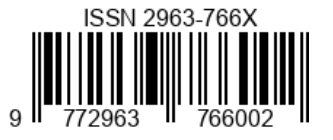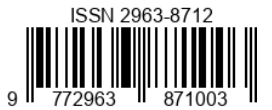Konsep Kecerdasan Buatan (Artificial Intelligence) Dalam Manajemen Kurikulum SD / MI
DOI:
https://doi.org/10.55606/jupiman.v3i1.3223Keywords:
Artificial Intelligence, Curriculum ManagementAbstract
Entering the era of Industrial Revolution 4.0 and the current era of Society 5.0, requires schools to upgrade and evolve so that they can produce great Human Resources and be ready to face this increasingly advanced era. A primary school education is important to prepare for this. Elementary school curriculum management must be planned and developed following the very rapid developments of the times and seeing student development. The curriculum leads to the course of the learning process in order to measure student learning outcomes. Artificial Intelligence is artificial intelligence technology to help humans survive, so it needs to be applied in the world of education as preparation for students to recognize and utilize technology in everyday life. Using the Narrative Literature Review method, this article describes the concept of curriculum management in artificial intelligence-based elementary schools through studying four relevant literature. In learning, Artificial Intelligence technology can act as a Tutor System, Intelligent Tutor, learning tools/media, and a guide for creating curriculum and education policies. The results of this research provide an overview of the concept of an Artificial Intelligence-based elementary school curriculum, so that it can serve as a guideline in SD/MI curriculum management activities.
Downloads
References
Chassignol, M., Khoroshavin, A., Klimova, A., & Bilyatdinova, A. (2018). Artificial Intelligence trends in education: A narrative overview. Procedia Computer Science, 136, 16–24. https://doi.org/10.1016/j.procs.2018.08.233
Chen, L., Chen, P., & Lin, Z. (2020). Artificial Intelligence in Education: A Review. IEEE Access, 8, 75264–75278. https://doi.org/10.1109/ACCESS.2020.2988510
Dai, Y., Chai, C. S., Lin, P. Y., Jong, M. S. Y., Guo, Y., & Qin, J. (2020). Promoting students’well-being by developing their readiness for the artificial intelligence age. Sustainability (Switzerland), 12(16), 1–15. https://doi.org/10.3390/su12166597
Ford, E. (2020). Tell me your story: Narrative inquiry in LIS research. College & Research Libraries, 81(2), 235–247. https://doi.org/https://doi.org/10.5860/crl.81.2.235
Frandsen, T. F., Sørensen, K. M., & Anne, L. F. (2021). Library stories: A systematic review of narrative aspects within and around libraries. Journal of Documentation, 77(5), 1128–1141. https://www.emerald.com/insight/content/doi/10.1108/JD-10-2020-0182/full/pdf?casa_token=8XldYSl2gfYAAAAA:bIUQM6DjDL6WPHEcC-ylfwU3pb_RNEnckNxvCFYrt__ZfXmMfMpfQIN5C6b9Adzt3SF3VxAhdPe7qnpzDc 2c2WilEXUzz3MgdqTgmSs24BLkF-Jf85ZZ
Fukuyama, M. (2018). Society 5.0: Aiming for a New Human-centered Society. Japan SPOTLIGHT, August, 8–13.
Hamalik, O. (2017). Manajemen Pengembangan Kurikulum. Remaja Rosdakarya.
Handayani, N. N. L., Muliastrini, N. K. E., & ... (2021). Pembelajaran Era Disrupsi Menuju Era Society 5.0 (Telaah Perspektif Pendidikan Dasar).In e-journal.stkip-amlapura.ac.id.http://e-journal.stkip amlapura.ac.id/index.php/jurnallampuhyang/article/download/252/145
Hermawansyah, H. (2021). Manajemen Lembaga Pendidikan Sekolah Berbasis Digitalisasi Di
Era Covid-19. Fitrah: Jurnal Studi Pendidikan. http://ejournal.stitbima.ac.id/index.php/fitrah/article/view/320
Hikmawati, N. (2020). Pandemi covid-19 Mendorong Literasi Teknologi dan Informasi di semua Lapisan Masyarakat. In Antologi Pendidikan di Masa Pandemi (pp. 127–136). KBM Indonesia.
Hwang, G. J., Xie, H., Wah, B. W., & Gašević, D. (2020). Vision, challenges, roles and research issues of Artificial Intelligence in Education. Computers and Education: Artificial Intelligence, 1, 1–5. https://doi.org/10.1016/j.caeai.2020.100001
Kamaludin, F. S., & Purnama, T. S. (2021). Religious moderation strategy in the virtual era and its implication to improving the quality of education. Jurnal Pendidikan Islam. https://eprints.uai.ac.id/1974/
Kemendikbudristek. (2021). Kebijakan Kurikulum untuk Membantu Pemulihan Pembelajaran.
Kementerian Pendidikan, Kebudayaan, Riset Dan Teknologi, November , 2021. https://drive.google.com/file/d/1r2vwr6eB9-9pRxc6y04d0oqai62CiEYf/view
Khaulani, F., Marsidin, S., & Sabandi, A. (2020). Analisis Kebijakan dan Pengelolaan Pendidikan Dasar terkait Standar Isi di Sekolah Dasar. Edukatif : Jurnal Ilmu Pendidikan, 2(2), 121–127. https://doi.org/10.31004/edukatif.v2i2.112
Manaf, A. (2015). Manajemen Kurikulum pembelajaran di madrasah:Pemetaan Pengajaran. Kalimedia.
Marini, A. (2014). Manajemen Sekolah Dasar. PT Remaja Rosdakarya.
NDörnyei, Z., & Ushioda, E. (2013). Teaching and researching motivation, second edition.
Teaching and Researching Motivation, Second Edition. https://doi.org/https://doi.org/10.4324/9781315833750
Rahadiantino, L. (2022). Implementasi Pembelajaran Artificial Intelligence Bagi Siswa Sekolah Dasar di Kota Batu, Malang, Jawa Timur. Jurnal Inovasi Pendidikan Dan Pembelajaran Sekolah Dasar, 6(1), 92–101. https://doi.org/10.24036/jippsd.v6i1.115857
Utami, R. (2019). Integrasi Kurikulum di Indonesia dalam Menghadapi Era Society 5.0. Prosiding 4th International Conference on Education, 213–218.
Downloads
Published
How to Cite
Issue
Section
License
Copyright (c) 2023 Jurnal Publikasi Ilmu Manajemen

This work is licensed under a Creative Commons Attribution-ShareAlike 4.0 International License.








